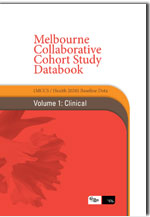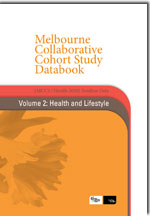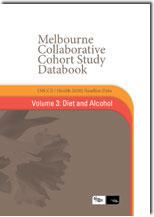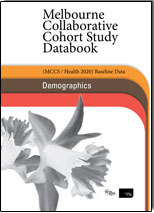Databook vol. 1: Clinical

This is one of four volumes in the series Melbourne Collaborative Cohort Study Databooks, which reports on data gathered at baseline in the Melbourne Collaborative Cohort Study (MCCS), also known as Health 2020.
The clinical data collection reported in this volume comprised:
- height
- weight
- waist circumference
- hip circumference
- lean and fat mass measured by bioelectric impedance
- blood pressure
- pulse
- blood samples for measuring blood glucose and
- cholesterol, and for storage to allow analysis of DNA and other substances of interest, such as hormones.
Databook vol. 2: Health & Lifestyle

Health 2020 researchers gathered general information through a questionnaire about aspects of people's lives that were not diet or alcohol related (these aspects are covered in separate volumes of this databook).
The questions covered people's social life, education and occupation, family medical history, health, smoking, physical activity and, for women, reproductive history, hysterectomy and female hormone use. A separate questionnaire about feelings was given to English-speaking participants.
Databook vol. 3: Diet & Alcohol

Assessing the association between diet and cancer was a priority of this study, requiring an accurate means of classifying people according to aspects of their diet. Since the early 1980s food frequency questionnaires (FFQs) have been the method of choice for large epidemiological studies.
When the Melbourne Collaborative Cohort Study began, there was no suitable, validated FFQ that covered the breadth of dietary exposures expected in the MCCS participants. So our own Food Frequency Questionnaire (which is now available for other research) was developed specifically.
Health 2020 Demographic Data

The Melbourne Collaborative Cohort Study (MCCS) researchers gathered general demographic information about each participant prior to collecting information on health and lifestyle (Appendix 1).
The demographic data collection comprised:
- which food items to include
- choice of frequency response options
- whether to ask about portion sizes
- what portions to use in calculating nutrients
- the nutrient database to use in the analysis.
Please refer to the general introduction, titled ‘About the MCCS' in the databook for more information.